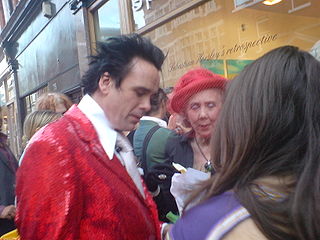A Quote by Richard Dawkins
Nature is not cruel, only pitilessly indifferent. This is one of the hardest lessons for humans to learn. We cannot admit that things might be neither good nor evil, neither cruel nor kind, but simply callous-indifferent to all suffering, lacking all purpose.
Related Quotes
Liberty, according to my metaphysics, is an intellectual quality, an attribute that belongs not to fate nor chance. Neither possesses it, neither is capable of it. There is nothing moral or immoral in the idea of it. The definition of it is a self-determining power in an intellectual agent. It implies thought and choice and power; it can elect between objects, indifferent in point of morality, neither morally good nor morally evil.
Reason, in a strict sense, as meaning the judgment of truth and falsehood, can never, of itself, be any motive to the will, and can have no influence but so far as it touches some passion or affection. Abstract relations of ideas are the object of curiosity, not of volition. And matters of fact, where they are neither good nor evil, where they neither excite desire nor aversion, are totally indifferent, and whether known or unknown, whether mistaken or rightly apprehended, cannot be regarded as any motive to action.
Where there is Love and Wisdom, there is neither Fear nor Ignorance.
Where there is Patience and Humility, there is neither Anger nor Annoyance.
Where there is Poverty and Joy, there is neither Cupidity nor Avarice.
Where there is Peace and Contemplation, there is neither Care nor Restlessness.
Where there is the Fear of God to guard the dwelling, there no enemy can enter.
Where there is Mercy and Prudence, there is neither Excess nor Harshness.
I could not become anything; neither good nor bad; neither a scoundrel nor an honest man; neither a hero nor an insect. And now I am eking out my days in my corner, taunting myself with the bitter and entirely useless consolation that an intelligent man cannot seriously become anything, that only a fool can become something.
Nothing can separate you from His love, absolutely nothing, neither death nor life, nor angels, nor principalities, nor powers, nor things present, nor things to come, nor height, nor depth, nor any other creature... We do not need to beg Him to bless us, He simply cannot help it. Therefore God is enough! God is enough for time, God is enough for eternity. God is enough!
Reality is neither subjective nor objective, neither mind nor matter, neither time nor space. These divisions need somebody to happen to, a conscious separate center. But reality is all and nothing, the totality and the exclusion, the fullness and the emptiness, fully consistent, absolutely paradoxical. You cannot speak about it, you can only lose yourself in it.
Only look to Jesus. He died for you, died in your place, died under the frowns of heaven, that we might die under its smile. Regard neither unbelief nor doubt. Fear neither sin nor hell. Choose neither life nor death. All these are swallowed up in the immensity of Christ and are triumphed over in His cross.
You may look back on your life and accept it as good or evil. But it is far, far harder to admit that you have been completely unimportant; that in the great sum of things all a man's endless grapplings are no more significant than the scuttlings of a cockroach. The universe is neither friendly nor hostile. It is merely indifferent. This makes me ecstatic. I have reached a nirvana of negativity. I can look futility in the face and still see promise in the stars.
Fundamentally, however, there is neither good nor evil; this is all based on human concepts. In the universe there exists neither good nor evil, because everything has been created in accordance with immutable laws. the divine principles are reflected in these laws, and only through knowing these laws will we be able to get close to the divine.
At the still point of the turning world. Neither flesh nor fleshless; Neither from nor towards; at the still point, there the dance is, But neither arrest nor movement. And do not all it fixity, Where past and future are gathered. Neither movement from nor towards, Neither ascent nor decline. Except for the point, the still point, There would be no dance, and there is only the dance.
The gods can either take away evil from the world and will not, or, being willing to do so, cannot; or they neither can nor will, or lastly, they are both able and willing. If they have the will to remove evil and cannot, then they are not omnipotent. If they can, but will not, than they are not benevolent. If they are neither able nor willing, then they are neither omnipotent nor benevolent. Lastly, if they are both able and willing to annihilate evil, how does it exist?



































